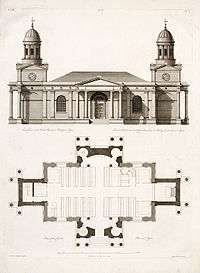Mistley Towers

Mistley Towers are the twin towers of the now demolished Church of St. Mary the Virgin at Mistley in Essex. The original Georgian parish church on the site had been built in classical style early in the 18th century following the death of Richard Rigby Esquire. Later in that century there was a grandiose plan by his son, the wealthy politician Richard Rigby, to transform Mistley Thorn into a spa town. Rigby wished to see a church from the windows of his mansion and a suitably grand church was required for the affluent visitors expected to patronise the new spa. Thus in 1776, the renowned architect Robert Adam was commissioned to enhance the church. His design was in the neoclassical style, with a tower at both the east and the west ends of the church. These are now all that remain of the once magnificent structure.

The square symmetrical towers are in the neoclassical style, resembling tall pavilions rather than towers, with each facade pedimented and the whole surmounted by a cupola decorated with blind windows interspersed by Ionic columns. At ground floor level two unfluted ionic columns at each corner support a decorative cornice. The columns are decorative only, and appear to serve no structural purpose. The design of the towers creates the impression that the building was once more of a miniature cathedral than a parish church. However, the main body of the church was small and occupied the (now empty) site between the two towers. It was a single story structure with a simple hipped roof and an entrance portico at its centre. This part of Adam's church was demolished in 1870, when the new parish church in New Road was built. The remaining towers are Grade I listed and a scheduled monument. [1][2]
References
External links
- Mistley Towers
- Teachers' resource pack:English Heritage
- History and research Mistley Towers: English Heritage
| Wikimedia Commons has media related to Mistley Towers. |
Coordinates: 51°56′45″N 1°04′39″E / 51.94594°N 1.07739°E